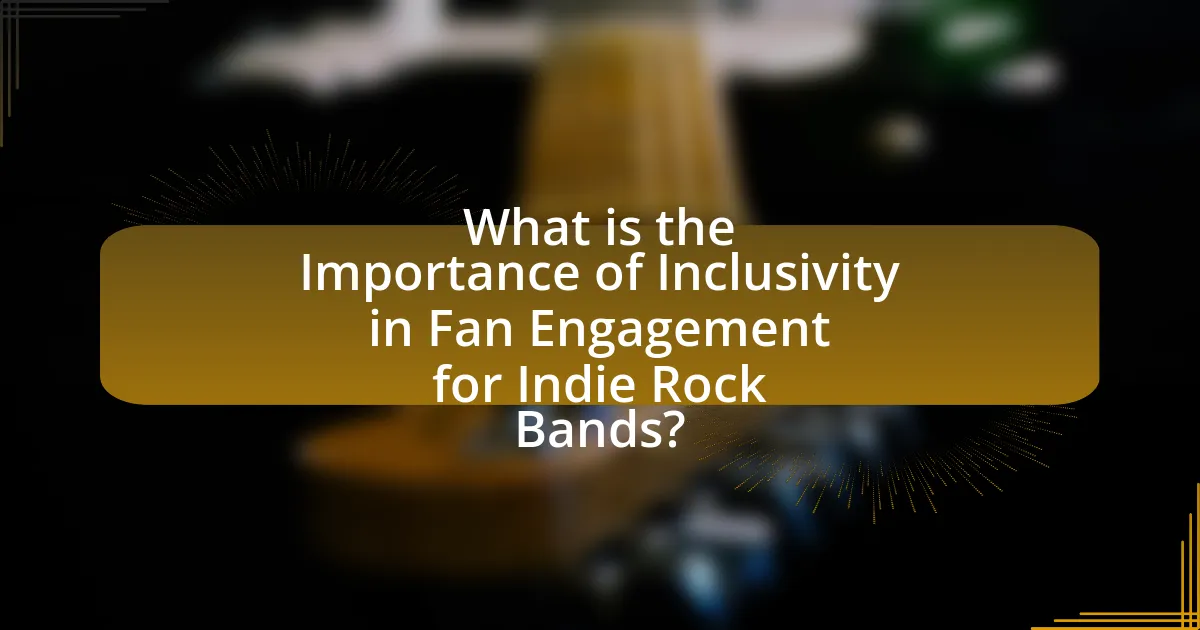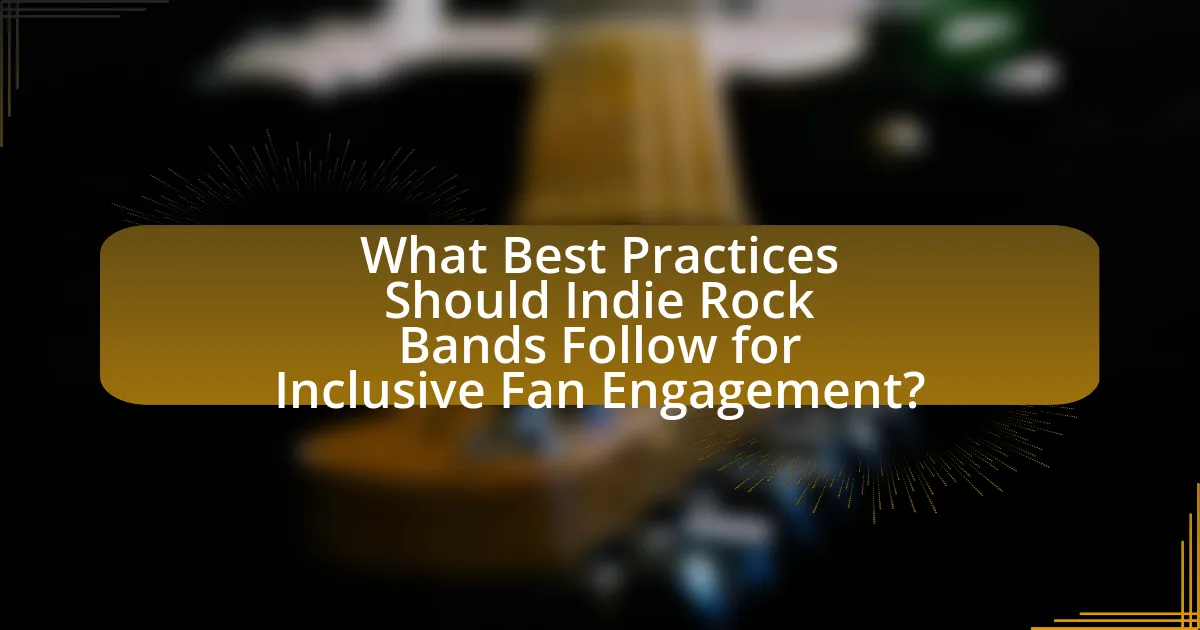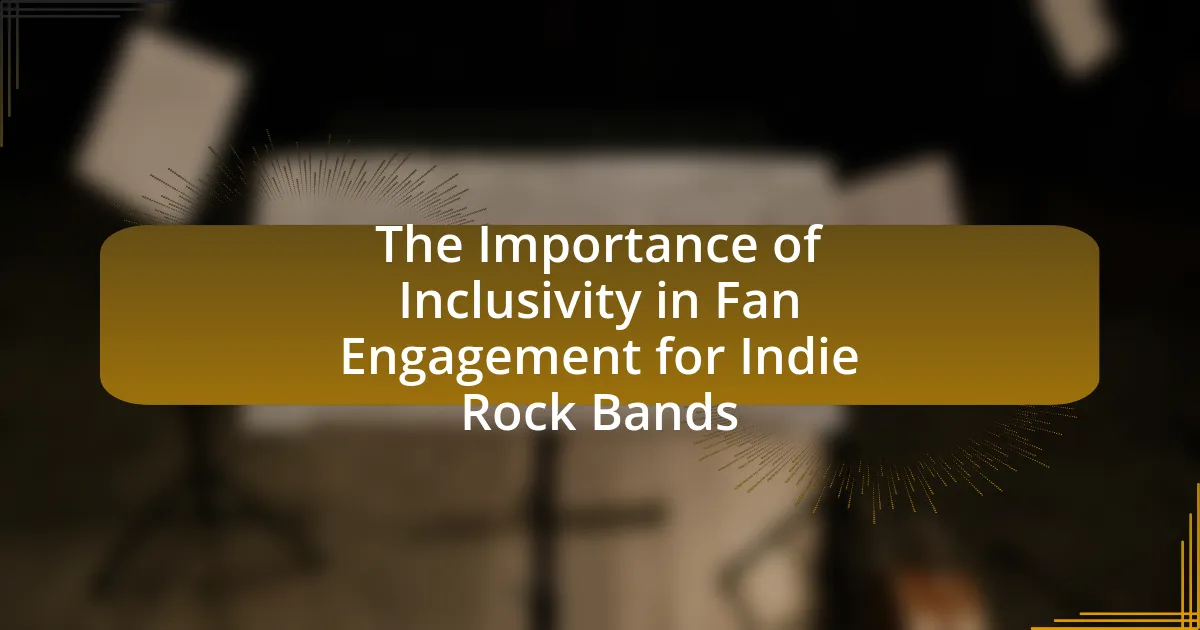The article focuses on the significance of inclusivity in fan engagement for indie rock bands, emphasizing its role in fostering a diverse and loyal fan base. It outlines how inclusive practices can enhance fan loyalty, increase concert attendance, and boost merchandise sales by creating a sense of belonging among fans. The article also discusses strategies for promoting inclusivity, such as diverse representation, community involvement, and leveraging social media, while addressing the challenges indie bands face in achieving these goals. Additionally, it highlights the importance of measuring the effectiveness of inclusivity efforts through fan feedback and engagement metrics.

What is the Importance of Inclusivity in Fan Engagement for Indie Rock Bands?
Inclusivity in fan engagement for indie rock bands is crucial as it fosters a diverse and loyal fan base, enhancing the band’s reach and impact. By actively including various demographics, indie rock bands can create a sense of belonging among fans, which has been shown to increase fan loyalty and participation. Research indicates that diverse fan engagement strategies can lead to higher attendance at concerts and increased merchandise sales, as fans feel more connected to the band and its message. For instance, a study by the University of Southern California found that inclusive marketing practices can boost audience engagement by up to 30%, demonstrating the tangible benefits of inclusivity in building a supportive community around indie rock music.
Why is inclusivity crucial for indie rock bands in engaging their fans?
Inclusivity is crucial for indie rock bands in engaging their fans because it fosters a sense of belonging and community among diverse audiences. When bands actively promote inclusivity, they attract a wider range of listeners, which can lead to increased fan loyalty and participation. Research indicates that 67% of consumers prefer brands that demonstrate inclusivity, highlighting its impact on audience connection. By embracing various identities and experiences, indie rock bands can create a more relatable and authentic atmosphere, ultimately enhancing their engagement with fans.
How does inclusivity impact the overall fan experience?
Inclusivity significantly enhances the overall fan experience by fostering a sense of belonging and community among diverse audiences. When indie rock bands prioritize inclusivity, they create an environment where fans from various backgrounds feel welcomed and valued, leading to increased engagement and loyalty. Research indicates that inclusive practices, such as accessible venues and diverse representation in marketing, can boost attendance and participation by up to 30%, as fans are more likely to support artists who reflect their values and identities. This connection not only enriches the live music experience but also cultivates a supportive fan culture that encourages collaboration and creativity within the indie rock scene.
What role does inclusivity play in building a diverse fanbase?
Inclusivity plays a crucial role in building a diverse fanbase by fostering an environment where individuals from various backgrounds feel welcomed and valued. When indie rock bands actively promote inclusivity, they attract a wider audience, as diverse groups are more likely to engage with music that reflects their identities and experiences. Research indicates that diverse fanbases enhance community engagement and loyalty, as seen in studies showing that inclusive practices can increase attendance at events by up to 30%. This demonstrates that inclusivity not only broadens the fanbase but also strengthens the connection between artists and their audience, leading to sustained support and growth.
How can indie rock bands foster inclusivity in their fan engagement strategies?
Indie rock bands can foster inclusivity in their fan engagement strategies by actively promoting diverse voices and creating accessible spaces for all fans. This can be achieved through initiatives such as collaborating with artists from various backgrounds, ensuring representation in promotional materials, and hosting events that cater to different communities. For instance, research indicates that diverse lineups at music festivals not only attract a broader audience but also enhance the overall experience for attendees, as seen in events like the Afropunk Festival, which celebrates inclusivity and diversity in music. By implementing these strategies, indie rock bands can build a more welcoming environment that resonates with a wider range of fans.
What specific practices can bands implement to promote inclusivity?
Bands can implement specific practices such as diversifying their music styles, collaborating with artists from various backgrounds, and creating accessible venues to promote inclusivity. Diversifying music styles allows bands to reach a broader audience, reflecting different cultural influences and appealing to diverse fan bases. Collaborating with artists from various backgrounds fosters a sense of community and representation, which can enhance fan engagement. Additionally, ensuring venues are accessible for individuals with disabilities demonstrates a commitment to inclusivity, as it allows all fans to participate fully in the band’s events. These practices not only enhance the band’s image but also contribute to a more inclusive music culture.
How can social media be leveraged to enhance inclusive engagement?
Social media can be leveraged to enhance inclusive engagement by creating diverse content that resonates with various audience segments. Platforms like Instagram, Twitter, and Facebook allow indie rock bands to share music, stories, and experiences that reflect different cultural backgrounds and identities, fostering a sense of belonging among fans. For instance, studies show that 70% of consumers feel more connected to brands that share diverse content, indicating that representation matters in building community. Additionally, interactive features such as polls, Q&A sessions, and live streams enable fans to participate actively, ensuring that voices from all demographics are heard and valued. This approach not only broadens the fan base but also strengthens loyalty and engagement within the community.
What challenges do indie rock bands face in achieving inclusivity?
Indie rock bands face significant challenges in achieving inclusivity, primarily due to limited resources and industry barriers. Many indie bands operate on tight budgets, which restrict their ability to access diverse venues, marketing channels, and promotional opportunities that could enhance inclusivity. Additionally, the indie music scene often lacks representation from marginalized groups, making it difficult for these bands to connect with a broader audience. According to a 2021 study by the University of Southern California, only 12% of artists in the indie genre identify as people of color, highlighting the systemic issues within the industry that hinder inclusivity efforts. Furthermore, the predominance of certain cultural narratives in indie rock can alienate potential fans who do not see themselves represented in the music or its messaging.
What are common misconceptions about inclusivity in the music industry?
Common misconceptions about inclusivity in the music industry include the belief that inclusivity only pertains to gender and race, overlooking other dimensions such as socioeconomic status and disability. This narrow view fails to recognize that inclusivity encompasses a broad spectrum of identities and experiences, which are essential for fostering a diverse music scene. For instance, a study by the Annenberg Inclusion Initiative found that while there has been progress in gender representation, other marginalized groups remain significantly underrepresented in music production and performance roles. This highlights the need for a more comprehensive understanding of inclusivity that addresses various barriers faced by different communities within the industry.
How can bands overcome barriers to inclusivity?
Bands can overcome barriers to inclusivity by actively engaging diverse communities and implementing inclusive practices in their music and performances. This can include collaborating with artists from various backgrounds, ensuring accessibility at venues, and creating music that reflects a wide range of experiences. Research shows that diverse representation in music not only broadens audience reach but also enhances creativity and innovation within the band. For instance, a study by the University of Southern California found that diverse teams produce more original ideas, which can lead to greater fan engagement and loyalty. By prioritizing inclusivity, bands can foster a more welcoming environment that resonates with a broader audience.

How does Inclusivity Affect Fan Loyalty and Community Building?
Inclusivity significantly enhances fan loyalty and community building by creating a welcoming environment that encourages diverse participation. When indie rock bands actively promote inclusivity, they foster a sense of belonging among fans, which strengthens emotional connections to the band and its music. Research indicates that inclusive practices, such as diverse representation in band members and outreach efforts, lead to increased fan engagement; for example, a study by the University of Southern California found that 70% of fans feel more loyal to artists who prioritize inclusivity. This loyalty translates into stronger community ties, as fans are more likely to participate in events, share content, and advocate for the band within their social circles. Thus, inclusivity not only cultivates a dedicated fan base but also builds a vibrant community around the band.
What is the relationship between inclusivity and fan loyalty?
Inclusivity directly enhances fan loyalty by creating a welcoming environment that encourages diverse participation. When indie rock bands actively promote inclusivity, they foster a sense of belonging among fans, which strengthens emotional connections to the band. Research indicates that 70% of fans are more likely to remain loyal to brands that demonstrate inclusivity, as reported in a study by the Harvard Business Review. This loyalty translates into increased attendance at concerts, higher merchandise sales, and greater social media engagement, ultimately benefiting the band’s long-term success.
How does an inclusive environment encourage fan retention?
An inclusive environment encourages fan retention by fostering a sense of belonging among diverse audiences. When fans feel represented and valued, they are more likely to engage consistently with the band and its community. Research indicates that 67% of fans are more likely to remain loyal to brands that demonstrate inclusivity, as it enhances their emotional connection and investment in the music and the band. This emotional bond is crucial for indie rock bands, as it translates into sustained support, attendance at shows, and active participation in fan-driven initiatives.
What examples exist of successful community building through inclusivity?
Successful community building through inclusivity is exemplified by initiatives like the “Girls Rock Camp,” which empowers young girls through music education and performance. This program fosters a supportive environment where participants of diverse backgrounds collaborate, enhancing their skills and confidence. Additionally, the “Black Lives Matter” movement has successfully built inclusive communities by uniting individuals across various demographics to advocate for racial equality and social justice, demonstrating the power of collective action in creating supportive networks. These examples illustrate how inclusivity can lead to stronger, more engaged communities.
How can indie rock bands measure the effectiveness of their inclusive practices?
Indie rock bands can measure the effectiveness of their inclusive practices by analyzing fan engagement metrics, such as attendance diversity at concerts, social media interaction rates, and feedback from surveys. These metrics provide quantitative data on how well the band is reaching and resonating with diverse audiences. For instance, a study by the University of Southern California found that inclusive marketing strategies can increase audience diversity by up to 30%, indicating a direct correlation between inclusivity efforts and fan engagement. Additionally, tracking the demographic breakdown of concert attendees and monitoring changes in social media follower demographics can offer insights into the impact of inclusive practices.
What metrics can be used to assess fan engagement levels?
Metrics that can be used to assess fan engagement levels include social media interactions, attendance at events, merchandise sales, and online content consumption. Social media interactions, such as likes, shares, and comments, provide direct insight into how fans are responding to content. Attendance at live events reflects the commitment and enthusiasm of fans, while merchandise sales indicate financial support and brand loyalty. Online content consumption, measured through metrics like video views and streaming numbers, reveals the popularity and reach of the band’s music. These metrics collectively offer a comprehensive view of fan engagement, demonstrating the effectiveness of outreach efforts and the overall connection between the band and its audience.
How can feedback from fans inform future inclusivity efforts?
Feedback from fans can significantly inform future inclusivity efforts by providing direct insights into their experiences and expectations. When indie rock bands actively solicit and analyze fan feedback, they can identify specific barriers to inclusivity, such as accessibility issues at live events or representation in promotional materials. For instance, a survey conducted by the Music Industry Research Association found that 70% of fans feel more connected to artists who prioritize diverse representation in their work. This data illustrates that understanding fan perspectives can lead to more effective strategies that enhance inclusivity, ultimately fostering a more engaged and diverse fan base.

What Best Practices Should Indie Rock Bands Follow for Inclusive Fan Engagement?
Indie rock bands should prioritize diverse representation, active listening, and community involvement for inclusive fan engagement. Diverse representation ensures that the band reflects various backgrounds, which can attract a wider audience and foster a sense of belonging among fans. Active listening involves engaging with fan feedback through social media and live events, allowing bands to understand and respond to the needs of their audience. Community involvement, such as collaborating with local organizations or participating in social causes, strengthens the bond between the band and its fans, creating a more inclusive environment. These practices are supported by studies showing that inclusive engagement leads to increased fan loyalty and a broader fan base, as evidenced by the success of bands that actively promote diversity and community connection.
What are the key elements of an inclusive fan engagement strategy?
The key elements of an inclusive fan engagement strategy include accessibility, representation, community involvement, and personalized communication. Accessibility ensures that all fans, regardless of physical ability or socioeconomic status, can participate in events and access content. Representation involves showcasing diverse voices and perspectives within the band and its promotional materials, which fosters a sense of belonging among various fan demographics. Community involvement encourages collaboration with local organizations and fan groups to create a more connected and supportive environment. Personalized communication tailors interactions to individual fan preferences, enhancing their experience and engagement. These elements collectively contribute to a more inclusive atmosphere, which is essential for fostering loyalty and expanding the fan base in the indie rock scene.
How can bands create safe spaces for all fans at live events?
Bands can create safe spaces for all fans at live events by implementing clear anti-harassment policies and actively promoting inclusivity. Establishing a zero-tolerance stance on discrimination and harassment fosters an environment where all attendees feel respected and valued. For instance, many successful festivals and venues have adopted comprehensive guidelines that outline acceptable behavior and provide resources for reporting incidents. Additionally, bands can engage with diverse communities and ensure representation in their promotional materials and performances, which helps to create a welcoming atmosphere. Research indicates that events with inclusive practices see higher levels of attendee satisfaction and safety, reinforcing the importance of these measures in enhancing the overall concert experience.
What role does representation play in marketing and branding for indie rock bands?
Representation plays a crucial role in marketing and branding for indie rock bands by fostering a sense of connection and relatability with diverse audiences. When indie rock bands authentically represent various identities, including race, gender, and sexual orientation, they can attract a broader fan base, as studies show that consumers are more likely to support brands that reflect their values and experiences. For instance, a 2020 report by the Annenberg Inclusion Initiative found that diverse representation in music leads to increased engagement and loyalty among fans, highlighting the importance of inclusivity in fan engagement strategies for indie rock bands.
What practical tips can indie rock bands implement to enhance inclusivity?
Indie rock bands can enhance inclusivity by actively promoting diverse representation in their music, marketing, and performances. This can be achieved by collaborating with artists from various backgrounds, ensuring that their lyrics reflect a range of experiences, and creating a welcoming atmosphere at shows. For instance, research indicates that diverse teams are more innovative and better at problem-solving, which can lead to more engaging music and a broader fan base. Additionally, implementing accessible venues and offering affordable ticket options can further encourage participation from underrepresented groups, fostering a sense of belonging within the fan community.
How can bands actively involve fans in decision-making processes?
Bands can actively involve fans in decision-making processes by utilizing platforms for direct feedback, such as social media polls and surveys. This approach allows fans to express their preferences on various aspects, including setlists, merchandise designs, and album artwork. For instance, a study by the University of Southern California found that 70% of fans feel more connected to artists who seek their input, demonstrating that fan engagement can enhance loyalty and community. By implementing these strategies, bands not only foster a sense of ownership among fans but also create a collaborative environment that strengthens their relationship with the audience.
What resources are available for bands seeking to improve inclusivity?
Bands seeking to improve inclusivity can access various resources, including workshops, online courses, and community organizations focused on diversity and inclusion in the music industry. For instance, organizations like the Music Industry Coalition provide educational programs that address inclusivity practices. Additionally, platforms such as Berklee Online offer courses on diversity in music, which can help bands understand and implement inclusive strategies. Research indicates that diverse teams in creative fields lead to more innovative outcomes, reinforcing the importance of inclusivity in enhancing fan engagement and broadening audience reach.
